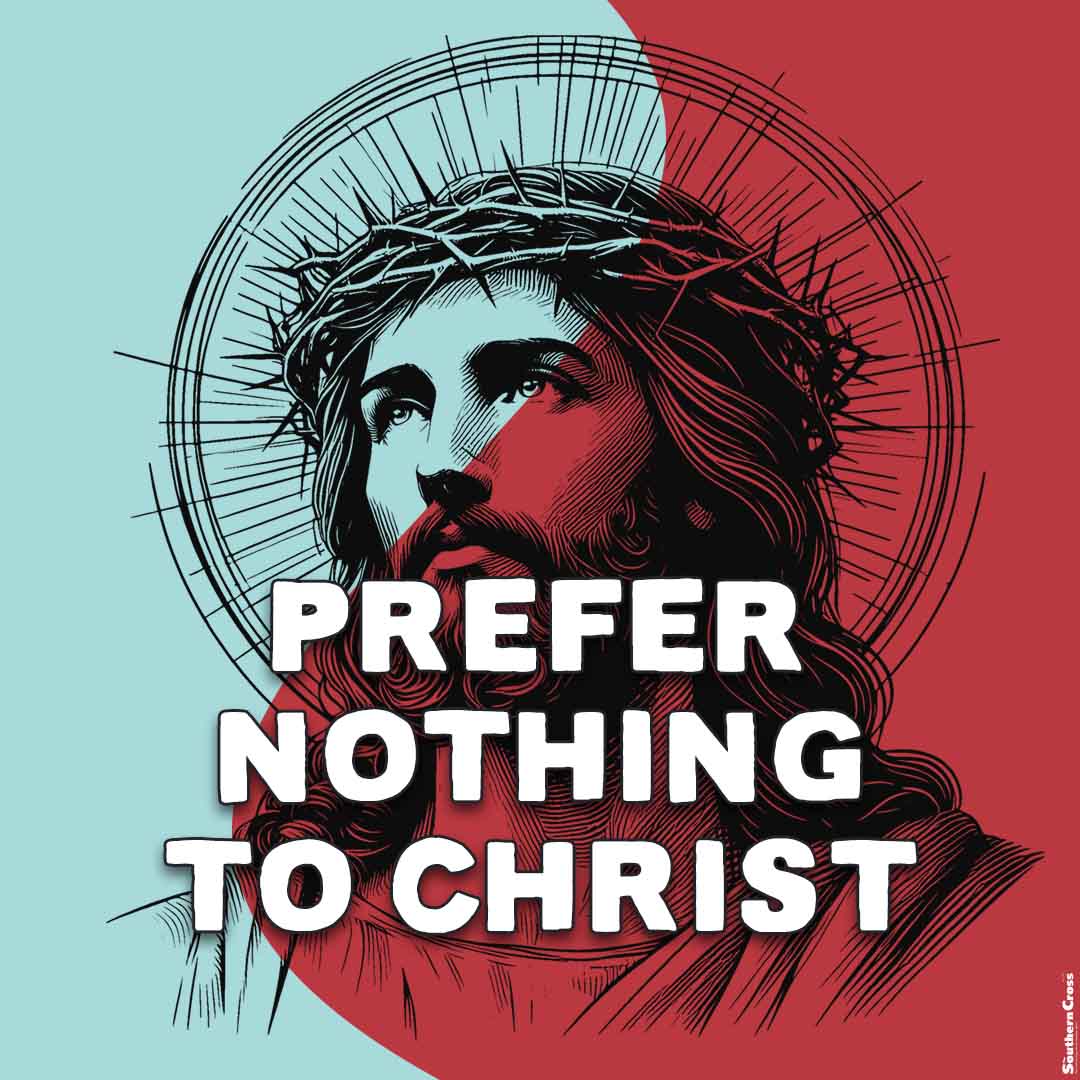Prefer Nothing to Christ: 18th Sunday in Ordinary Time
 Sermon by Emmanuel Suntheni OSB – Eighteenth Sunday in Ordinary Time – Year C
Sermon by Emmanuel Suntheni OSB – Eighteenth Sunday in Ordinary Time – Year C
Sermon and Christian Act In The Word
Theme: Nothing is Permanent except Jesus Christ! All is vanity! Think & live Beyond Vanity! Everything is Vanity, but Christ lives forever
Point of Reflection: Today’s liturgy exhorts believers to judge carefully what brings lasting security and happiness. Do I desire to receive more than to give? Have I hoarded shoes, clothing, or any other material things that I do not really need? Everything is Vanity except Jesus Christ.
No matter how many houses we build on this earth, we are all tenants.
Consider this: we are tenants even in our own bodies, for our bodies are not ours to keep. Death is indeed a great leveller. It makes both the rich and poor lie on the same bed of earth. No one carries anything with them. Let not the beautiful tiles that are put in the graves of the rich deceive anyone; it is only opium to ease the painful thought of death, but it gives no comfort whatsoever to the dead.
First Reading: Ecclesiastes 1:2, 2:21–23
Psalm: Psalm 90:3–6, 12–13
Second Reading: Colossians 3:1–5, 9–11
Gospel: Luke 12:13–21
Sermon (Reflection): St Benedict in his rule for monks and nuns he says ‘prefer nothing to Christ’, This is exactly the teaching of today’s Scriptures. Today’s readings reflect on the human desire for security and permanence. This desire can only be satisfied by looking beyond the fragile and transitory realities of this passing world, which the Israelite thinker, Qoheleth, called “vanity”.
In the first reading of today, Qoheleth says that “everything is vanity”. Making this statement, Qoheleth put under scrutiny the values and practices that were accepted and cherished by the majority of the people in his day. In reality, Qoheleth was a profoundly reflective thinker in search of something that could withstand the challenge of death. Sadly, he found nothing, which led him to the famous conclusion, which summarised the results of his quest “Vanity of vanities, all is vanity”.
The word “vanity” as used by Qoheleth is usually grossly misunderstood. The Hebrew word translated as “vanity” literally means “vapour” or “breath”. Stating that everything is “vapour” Qoheleth did not pass a value judgment on human experiences and achievements, calling them worthless and vain, as some imagine. He meant that everything is temporary and passes away; there is nothing permanent in this world. He honestly acknowledges that death brings all human endeavours and projects to an end.
Since everything ends, human beings cannot find lasting happiness and permanent fulfilment in anything that they work for, create or experience in this world.
Today’s reading presents Qoheleth’s reflection on the value of work. According to the thinking of his day, hard work and dedication would be rewarded by a prosperous and long life. However, Qoheleth honestly acknowledged that hard work does not make human life endure. All the toil, strain, and concern that consumes a person’s life will, in the end, bear only a temporary and limited fruit. When the inevitable death comes, all that a person achieved and gained will be left to others to enjoy. Thus, Qoheleth concluded that hard work brings no lasting benefit. One should enjoy and find pleasure in a balanced life, and in work and achievements, but also acknowledge its limits, and not be consumed by it. This, and other reflections of this kind, led to the labelling of Qoheleth as a notorious pessimist. In fact, he was a realist, an honest thinker engaged in a search for something permanent and lasting that he could devote his life to, and which could give lasting meaning to his life. Sadly, his quest ended in failure because of the overwhelming and unchallenged power of death that makes all things in this world “vapour” for him.
The quest for permanence and lasting values was also on the mind of Paul when he wrote to the Colossians. He had an advantage over Qoheleth because of his experience of Christ, and the knowledge of eternal life which the Israelite sage lacked. Thus, unlike Qoheleth, he could see beyond death, which led him to very different reflections and conclusions.
Paul begins with a captivating statement that believers have already been raised with Christ. This broadens the horizon of Paul’s reflection beyond the boundary of death which Qoheleth could not cross. Christians joined by faith to the Risen Lord already have his immortal life in them. Thus, they live in an indestructible and permanent existence, while still dwelling in this passing world and in their mortal bodies. Still, the ultimate horizon of their life is joining Christ in the heavenly world; their destiny lies beyond death.
This causes a certain tension because believers are still a part of the earthly reality while already belonging to the heavenly world. Therefore, Paul reminds them that they must not lose sight of their true destiny and their future. He calls on the Colossians to set their minds on the things of heaven and focus on their true life “hidden with Christ”.
This is the life of faith that will come in its full expression when Christ returns in glory.
Waiting for this event, believers must separate themselves from the moral vices, sins, and passions which are a part of this world but have no place in the future life. These aspects of earthly life are impermanent; they are “vapour” that passes away. They belong to the Colossians’ “old self” which has been “stripped off” and replaced by the new self, a new identity. Paul describes this new self as reflecting the image of God. He alludes here to the creation story where human beings were brought to life in the image of God (Cf. Gen 1:26). In this new reality, the ethnic, religious, and social distinctions no longer apply – there are no more Jews and Gentiles, slaves or free, but all belong to Christ who is “all in all”.
In this beautiful passage, Paul teaches that his faithful already have eternal life because they are a new creation in Christ. Thus, they live a permanent and immortal life guaranteed by the one who overcame death. In him, believers also overcame death, to use Qoheleth’s language, they moved beyond “vanity”.
The gospel passage of today contains a well-known story of the rich fool. It is a tragic and ironic tale of a man who chose vanity as the goal for his life and lost. The story is set in the context of one man’s quest to claim the family inheritance from his brother. Approaching Jesus as if he were a judge, the man requests him to arbitrate in a family dispute. Jesus refuses and takes this request as an opportunity to deliver a striking critique of wealth and a warning against the dangers it brings. To make his point clear, Jesus tells the story of a wealthy man utterly preoccupied with securing his life and happiness on earth. Taking advantage of an abundant harvest, the man gathers enough grain to have food and sufficient profits to feast and relax for the rest of his life. Ironically, his life ends before he could even begin to enjoy what he gathered. The echo of Qoheleth’s teaching is unmistakable here. What the man gathered, he could not enjoy; it went to someone else. He focused his life entirely on the pursuit of “vanity” and lost it as a result. God called the man a “fool” because he utterly misjudged what can bring lasting security and happiness. Telling this story, Jesus warned his audience not to make the same mistake lest they become fools in pursuit of “vapour”, as the rich man did.
Only what counts as a value in God’s eyes can bring lasting happiness and security.
Christian Act in Word of God: “All is Vanity! Beyond Vanity”
In the parable of the Rich Fool, as narrated by Jesus, God says to the rich man, “You fool! This very night, your life is being demanded of you. And the things you have prepared, whose will they be?” This fact of life prompted Qoheleth to say, “…Vanity of vanities! All is vanity…”
Neither Qoheleth nor Jesus is against wealth creation. However, the inordinate desire for material things gives birth to insubordinate triplets of consumerism, materialism, and hedonism. Such an insatiable desire and self-feeding approach to life soon degenerates into greed.
At the heart of greediness is a deep-seated feeling of insecurity. The fear of not having enough in the future has lured many to pursue a path of self-destruction. In pursuit of fleeting wealth, there are people who have lost touch with their spouses and children and in the process strangled love. Some have chosen to debase their bodies in exchange for a few coins for their hole-ridden money purse. In a bid to secure the future, some lose the present, and when the future finally becomes present, they find themselves buried in their past.
Jesus is the surest and most reliable security one can ever have. He is the solid rock on which a happy and lasting life can be built. Prefer nothing to Christ.
Action: This week, I turn to the Lord Jesus Christ in prayer; I ask him to take charge of my future and be my security every moment of life’s journey. I will pay special attention to avoiding vanity and pride in my words and actions.
Prayer: Eternal Father, deliver us from those desires of ours that seek to enslave us with material things of this world. Secure us with the safest anchor, your Son Jesus Christ, our Lord, as everything is vanity except your Word and Son Jesus Christ, Amen.
- A Call to Repentance: 2nd Sunday of Advent - December 5, 2025
- Prepare to Receive the Lord: 1st Sunday of Advent - November 28, 2025
- The Healer of Brokenness: Christ the King - November 21, 2025





